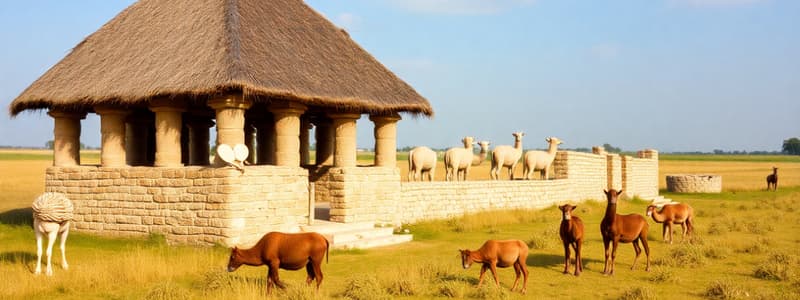Podcast
Questions and Answers
Which philosophical systems significantly influenced Chinese culture and values?
Which philosophical systems significantly influenced Chinese culture and values?
- Existentialism and Phenomenology
- Stoicism and Epicureanism
- Utilitarianism and Rationalism
- Confucianism and Daoism (correct)
What was a major benefit of the Silk Road for China?
What was a major benefit of the Silk Road for China?
- Development of a unified legal system
- Increased agricultural productivity
- Enhanced military strategies
- Cultural exchange with other regions (correct)
Which of the following inventions is credited to ancient China?
Which of the following inventions is credited to ancient China?
- The telephone
- Electricity generation
- Steam engine
- Gunpowder (correct)
What common characteristic did ancient civilizations like the Mayans and Aztecs share?
What common characteristic did ancient civilizations like the Mayans and Aztecs share?
Which key concept underlines the importance of water management in ancient settlements?
Which key concept underlines the importance of water management in ancient settlements?
Which civilization is known for its advanced urban planning in the Indus Valley?
Which civilization is known for its advanced urban planning in the Indus Valley?
What significant role did agriculture play in early civilizations?
What significant role did agriculture play in early civilizations?
Which of the following was a significant contribution of Ancient Greece?
Which of the following was a significant contribution of Ancient Greece?
What was a key achievement of Roman engineering?
What was a key achievement of Roman engineering?
Which major theme is central to the study of ancient history?
Which major theme is central to the study of ancient history?
What key characteristic distinguishes city-states in Ancient Greece?
What key characteristic distinguishes city-states in Ancient Greece?
Which civilization is recognized for its monumental pyramids and complex religious practices?
Which civilization is recognized for its monumental pyramids and complex religious practices?
What was one of the key contributions of Roman political institutions?
What was one of the key contributions of Roman political institutions?
Flashcards
Confucianism
Confucianism
A key development that transformed Chinese culture, shaping its values and principles. It emphasizes moral conduct, social harmony, and respect for authority.
Silk Road
Silk Road
A network of trade routes connecting China to Europe and other parts of Asia, facilitating the exchange of goods, ideas, and cultural influence.
Chinese Inventions
Chinese Inventions
Major inventions originating in China that revolutionized technology and communication, impacting the world for centuries.
Urbanization
Urbanization
Signup and view all the flashcards
Political Systems
Political Systems
Signup and view all the flashcards
Ancient History
Ancient History
Signup and view all the flashcards
Agricultural Revolution
Agricultural Revolution
Signup and view all the flashcards
Early Civilizations
Early Civilizations
Signup and view all the flashcards
City-States
City-States
Signup and view all the flashcards
Socrates
Socrates
Signup and view all the flashcards
Democracy
Democracy
Signup and view all the flashcards
Roman Empire
Roman Empire
Signup and view all the flashcards
Dynastic Rule in China
Dynastic Rule in China
Signup and view all the flashcards
Study Notes
Overview of Ancient History
- Ancient history encompasses the period from the earliest human civilizations to the beginnings of recorded history, varying considerably by region.
- Different regions had different timelines for their ancient periods.
- Studying ancient history relies on archaeology, historical accounts, and artifact analysis.
- Key themes include the development of agriculture, urbanization, governance, political systems, and cultural practices.
Early Civilizations
- Early civilizations arose in Mesopotamia, Egypt, the Indus Valley, and the Yellow River valley.
- Agricultural advancements allowed for settled communities and population growth.
- Advancements occurred in writing systems, mathematics, astronomy, and architecture.
- Mesopotamia developed cuneiform writing and city-states.
- Ancient Egypt displayed monumental architecture (pyramids), elaborate religious beliefs, and complex burial rituals.
- Indus Valley civilization showcased advanced urban planning.
- Early Chinese dynasties emerged in the Yellow River valley.
Ancient Greece
- Ancient Greece, centered around city-states like Athens and Sparta, significantly influenced Western thought.
- Philosophy, democracy, drama, and literature flourished.
- Greek city-states frequently engaged in warfare.
- Military strategy and tactics were developed.
- Philosophers like Socrates, Plato, and Aristotle explored fundamental questions.
- Greek art and architecture impacted later Western cultures.
Ancient Rome
- The Roman Empire expanded across Europe, North Africa, and the Middle East from the Italian peninsula.
- Roman law and political systems profoundly affected later civilizations.
- Impressive engineering feats, like aqueducts and roads, characterized the era.
- The Roman Republic transformed into an empire under emperors.
- Roman culture influenced language, law, and governance in various regions.
- The rise and fall of the Roman Empire was pivotal.
Ancient China
- Early Chinese civilizations along the Yellow River established dynastic rule.
- Confucianism and Daoism shaped Chinese culture and values.
- The Silk Road facilitated cultural exchange between China and other regions.
- Significant inventions emerged, including gunpowder, papermaking, and printing.
- Chinese dynasties experienced prosperity and turmoil.
Other Ancient Civilizations
- Concurrent civilizations like the Mayan in Mesoamerica and the Aztec Empire existed globally.
- The Mayan civilization advanced mathematics and astronomy.
- Each civilization possessed unique features, social structures, and contributions to knowledge.
- Studying these civilizations reveals the diversity of early human societies.
Key Concepts in Ancient History
- Agriculture’s role in settled communities
- Urbanization's impact on cities
- Political systems and governance
- Cultural practices and beliefs
- Technological advancements
- Trade routes and cultural exchange
- The rise and fall of empires
- Warfare and military strategy
- Religion and spirituality
- Social hierarchies and class structures
- Writing systems and record-keeping
Studying That Suits You
Use AI to generate personalized quizzes and flashcards to suit your learning preferences.




